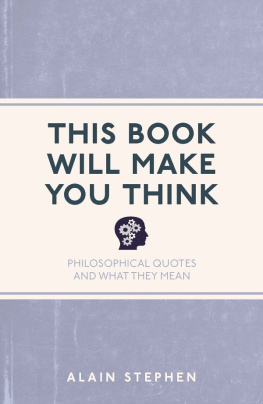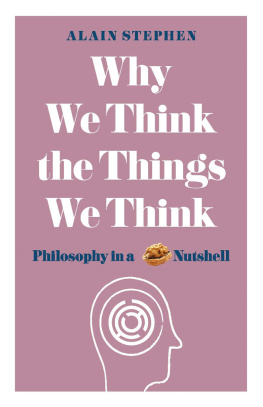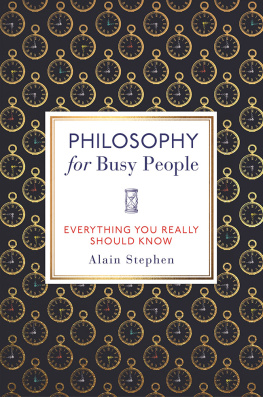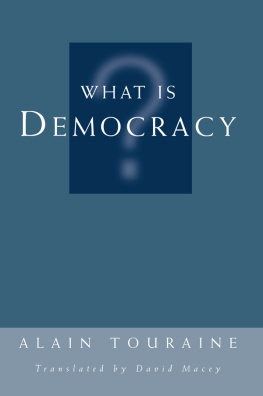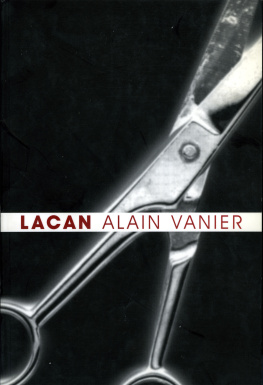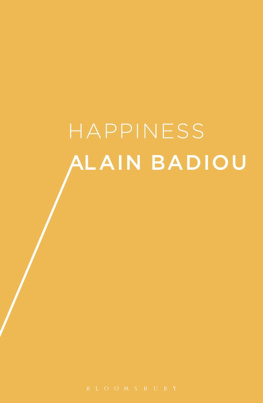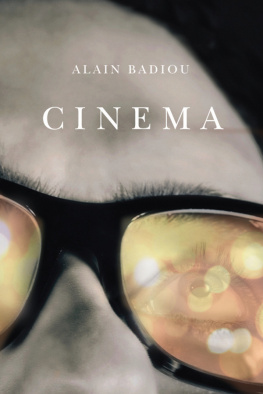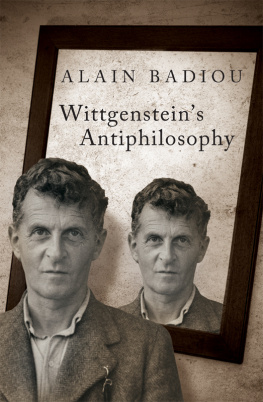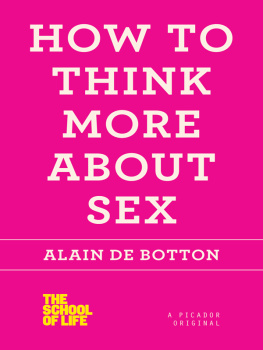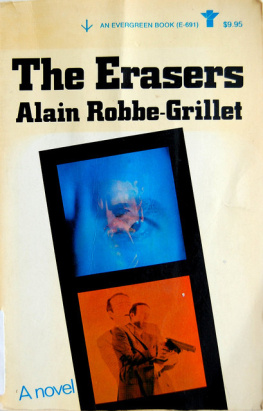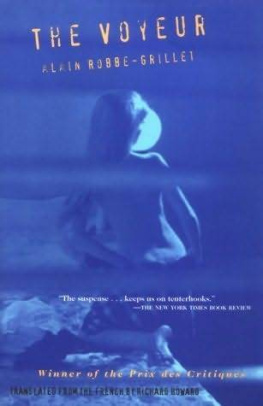Alain Stephen - This Book Will Make You Think
Here you can read online Alain Stephen - This Book Will Make You Think full text of the book (entire story) in english for free. Download pdf and epub, get meaning, cover and reviews about this ebook. publisher: Michael O’Mara, genre: Religion. Description of the work, (preface) as well as reviews are available. Best literature library LitArk.com created for fans of good reading and offers a wide selection of genres:
Romance novel
Science fiction
Adventure
Detective
Science
History
Home and family
Prose
Art
Politics
Computer
Non-fiction
Religion
Business
Children
Humor
Choose a favorite category and find really read worthwhile books. Enjoy immersion in the world of imagination, feel the emotions of the characters or learn something new for yourself, make an fascinating discovery.
- Book:This Book Will Make You Think
- Author:
- Publisher:Michael O’Mara
- Genre:
- Rating:5 / 5
- Favourites:Add to favourites
- Your mark:
- 100
- 1
- 2
- 3
- 4
- 5
This Book Will Make You Think: summary, description and annotation
We offer to read an annotation, description, summary or preface (depends on what the author of the book "This Book Will Make You Think" wrote himself). If you haven't found the necessary information about the book — write in the comments, we will try to find it.
This Book Will Make You Think — read online for free the complete book (whole text) full work
Below is the text of the book, divided by pages. System saving the place of the last page read, allows you to conveniently read the book "This Book Will Make You Think" online for free, without having to search again every time where you left off. Put a bookmark, and you can go to the page where you finished reading at any time.
Font size:
Interval:
Bookmark:


First published in Great Britain in 2013 by
Michael OMara Books Limited
9 Lion Yard
Tremadoc Road
London SW4 7NQ
Copyright Michael OMara Books Limited 2013, 2016
All rights reserved. You may not copy, store, distribute, transmit, reproduce or otherwise make available this publication (or any part of it) in any form, or by any means (electronic, digital, optical, mechanical, photocopying, recording or otherwise), without the prior written permission of the publisher. Any person who does any unauthorized act in relation to this publication may be liable to criminal prosecution and civil claims for damages.
A CIP catalogue record for this book is available from the British Library.
978-1-78243-506-8 in paperback print format
978-1-78243-097-1 in ePub format
978-1-78243-098-8 in Mobipocket format
Illustration by David Woodroffe
Typeset by K.DESIGN, Winscombe, Somerset
www.mombooks.com

All this twaddle, the existence of God, atheism, determinism, liberation, societies, death, etc., are pieces of a chess game called language, and they are amusing only if one does not preoccupy oneself with winning or losing this game of chess.
Marcel Duchamp (18871968)
I t is difficult, almost impossible, to give a clear definition of philosophy. In his History of Western Philosophy, Bertrand Russell suggests that philosophy sits astride the fields of science and theology, applying reason to hypotheses in areas where hard facts are not yet available. In another sense, philosophy is everything that it is not, and not (quite) everything that it is or at least that is perhaps the conclusion that Austrian-British philosopher Ludwig Wittgenstein would have come to, although, no doubt, he would have had second (or third or fourth ) thoughts on the matter. In a classic case of hedging your bets, Wittgenstein, perhaps the most famous philosopher of the last century, memorably stated in one of his artfully constructed propositions that everything could be something other (different) from that which it is. It is hard not to dispel a dizzying sense of unnerving anxiety, bordering on downright fear, if one considers for too long the proposition that everything may not be what it seems.
OK, so best we dont think about it too much. Whatever will happen will happen, regardless of our thoughts or interventions (if we believe in Taoism). Or perhaps there are universal truths regarding existence, consciousness, nature, God, the universe, Heaven and Hell, life and death, form and content and our construction and distortion of these key concepts (if we subscribe to ontology)? Or put another way, how did we come up with those big ideas in the first place? How did our knowledge develop and what processes did it go through (as we might ask if we are interested in epistemology)? Philosophy is everywhere, whether we like it or not. The mere act of trying not to think about things too deeply is in itself a form of philosophical enquiry, as a recent life experience demonstrated.
Not long ago I had a conversation with an old friend who had just been made redundant from his job. Naturally I assumed my friend would be upset, anxious about the future, concerned for the well-being of his family and possibly angry or resentful towards his employers. To my surprise, he appeared positively upbeat and not the least dismayed about his misfortune. Looking at it philosophically, my friend said, this was caused by a situation beyond my control. These things are sent to test us and sometimes you just have to take it on the chin and move on. After all, as one door closes, another opens, and this will provide the impetus for me to do something different.
Although on the surface this appears to be a simple and pragmatic response to adversity, on closer examination there is a good deal of philosophical thought buried beneath those clichs. The acceptance of forces acting beyond the sphere of individual human influence has echoes in the fatalism of ancient Greece; taking it on the chin and moving on is a Stoicism that also dates back to the classical age. Similarly, the idea that as one door closes, another opens could have been lifted from the central tenets of Taoism which, interestingly, is in direct opposition to the free will expressed in the impetus to do something different and change. As you can see, every conscious decision or point of view, even on the seemingly mundane level of the everyday, contains a wealth of differing ideas and perspectives. We are all, in our own ways, philosophers.
The French writer and artist Marcel Duchamp would have agreed with the idea that everything we think and feel is intrinsically linked to some form of philosophy, despite his predisposition towards nihilism and the belief in nothing. Duchamp is most famous, of course, for exhibiting an upturned urinal in a New York gallery and claiming it was a sculpture (wryly titled Fountain). If Duchamps practical joke was intended to signal the end of art, or expose the hypocrisy and pomposity of the art world that he had grown to despise, it spectacularly failed in its aim: indeed, a recent poll of international art critics voted Duchamps Fountain as the most influential artwork of the twentieth century. Beyond all the twaddle, though, the true irony is that it conclusively proves that even the belief in nothing constitutes a belief in something.
Furthermore, Duchamps assertion that all of the major themes of philosophy are, metaphorically speaking, pieces of a chess game called language correlates with Wittgensteins view of language as a game. The metaphor is particularly apposite. For Wittgenstein, the rules of language mirror the rules of games in their structures and what they include and exclude. Philosophical investigations (to borrow the title of one of Wittgensteins works) are therefore built around structures, movements and patterns, just like a game of chess. The game lies in recognizing and analysing the patterns, untangling the false moves that dont conform to the rules and deciding which step may be the best to make next.
I chose the Duchamp quote to preface the introduction to this book as I believe that a lot of people do dismiss philosophy as twaddle. So-called big ideas can be intimidating, making us feel at best vulnerable and at worst unworthy or stupid. This is a shame, as the history of philosophy is a rich treasure trove of insight that can be both comforting and life-affirming, as well as providing, in some instances, the positive need to question assumptions and reconsider what we may once have thought to be true.
This book is by no means a comprehensive history of philosophy. Instead it is meant more as a sampler an hors doeuvre or amuse bouche designed to whet the appetite for a lavish and varied meal. In this respect, whilst aiming to cover some of the key flavours of philosophy, Ive tried not to get too bogged down with the complicated details of various isms and schools of thought. A lot of philosophy is hard to swallow, some of it wilfully so, especially the post-modern twentieth-century varieties, so I have deliberately avoided some of the more impenetrable theories from the likes of Jacques Derrida or Jean-Franois Lyotard. There are also undoubtedly other omissions; the curse of the anthologist is that one has to accept, like many a philosopher has come to realize in the past, that you simply cant please all of the people all of the time.
Next pageFont size:
Interval:
Bookmark:
Similar books «This Book Will Make You Think»
Look at similar books to This Book Will Make You Think. We have selected literature similar in name and meaning in the hope of providing readers with more options to find new, interesting, not yet read works.
Discussion, reviews of the book This Book Will Make You Think and just readers' own opinions. Leave your comments, write what you think about the work, its meaning or the main characters. Specify what exactly you liked and what you didn't like, and why you think so.

